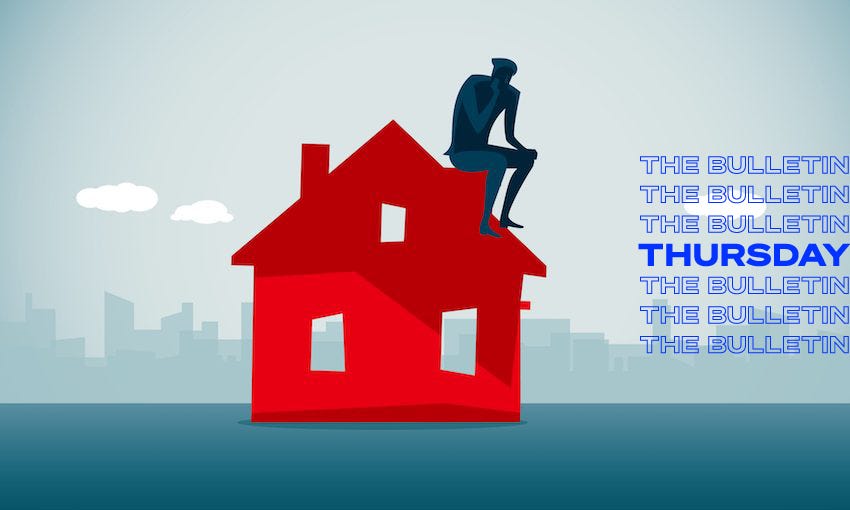House prices are falling - isn't that what we want?
A year ago, the overpriced housing market was the number one concern for New Zealanders. Now, it's "doom and gloom" as prices fall. One economist says falling prices should be a relief
Mōrena and welcome to The Bulletin for Thursday, December 1, by Anna Rawhiti-Connell. Presented in partnership with Z Energy.
In today’s edition: Fair Pay Agreement legislation comes into effect today; half of the world’s democracies are in decline; new poll on voting age; but first, falling house prices will be “a relief” to most says one economist
ANZ chief economist Sharon Zollner says most New Zealanders will see a forecasted drop in house prices as a relief (Getty Images)
The difference a year makes
Congratulations everyone, we’ve made it to the last month of the year. And what a difference a year makes. An Ipsos poll had the price of housing at the top of the list of things most concerning us in October last year. The national average house price climbed over the million dollar mark in November 2021. Building consents hit record highs in September that year. According to Stats NZ figures released yesterday, October 2022’s residential housing consent numbers were the lowest they've been this year, (apart from quiet January). New figures out from Corelogic this morning have the national average house price at $958,622 for November 2022.
Forecast drop in prices “a relief” - economist
As a new-ish homeowner who plans to never move again, I still have enough muscle memory to recall how hopeless it felt last year. Taking into account the general rule about the correlation between house prices and how wealthy we feel, rising interest rates and broader talk of a recession, the prolific doom and gloom headlines about falling house prices can still feel a bit odd to me. ANZ chief economist Sharon Zollner said something yesterday that I feel like we haven’t heard much off and that’s that most New Zealanders will see a forecasted drop in house prices as a relief. The bank’s wage adjusted forecast house price drop of 32% would bring us to 10% below pre-pandemic levels.
The generational wealth gap
New research out today from economist Shamubeel Eaqub continues to point to a big generational wealth gap. A child born in 2000, will earn on average $50k less over their lifetime than someone born 30 years earlier. “We told ourselves that increasing house prices was a good thing and just let it happen without building enough houses. We chose to massively underinvest in social housing so that people that become poor become homeless. We made our children poorer,” says Eaqub. Even as prices fall, debt-servicing costs rise. Saving for a home deposit is 19% harder than it was five years ago but is improving according to a new online tool released last week by the Ministry of Housing and Urban Development.
Mixed bag for renters, those needing social housing and iwi
Homeowners aren’t the whole of the picture when we discuss housing in New Zealand and it’s a mixed bag at the moment for renters, those on the public housing waiting list and iwi wanting to develop housing on ancestral land. Rents rose by 4.1% nationwide in the year to October but there are signs growth in rent prices is easing. The number of people on social housing waiting lists has fallen by just under 7% in six months. And here’s a good news story to end from Stuff’s Te Aorewa Rolleston. Matamata-Piako District Council is proposing to make changes to its district plan to enable papakāinga to be developed in the area more freely.
Join the EV journey with us
Z Energy is thinking about how they can support EV drivers beyond the chargers they’re already rolling out at Z service stations. It’s part of their commitment to support Aotearoa New Zealand’s energy transition. Z’s working on an EV Home Charging Plan that provides a safe and affordable way to fast charge your EV at home. Join the journey with Z by registering your interest today and be the first to know when this offer becomes available. (Sponsored)
Fair pay paperwork to be filed today for hospitality workers
The Fair Pay Agreement Act takes effect from today. As the Herald’s Jenée Tibshraeny reports (paywalled) this morning, Unite Union plans to submit paperwork with the Ministry of Business, Innovation and Employment (MBIE) today to get approval to start fair pay bargaining on behalf of hospitality workers. Charlotte Muru-Lanning, editor of The Spinoff’s excellent food newsletter, The Boil Up (new edition out this afternoon), has taken a look at what an FPA might look like for the sector.
Half of the world's democracies are in a state of decline
The International Institute for Democracy and Electoral Assistance (IDEA) has published its annual report. The report finds that half of the world's democracies are in a state of decline “amid worsening civil liberties and rule of law while already authoritarian governments are becoming more oppressive.” The Collins Dictonary word of the year for 2022 was “permacrisis” and the report cites “a multitude of crises, from the cost of living to risks of nuclear confrontation and the acceleration of the climate crisis.” Finland’s prime minister Sanna Marin highlighted her concerns about “dependencies that we have right now on authoritarian countries” in yesterday’s press conference with prime minister Jacinda Ardern.
Majority opposed to lowering the voting age
A new Herald poll (paywalled) shows 79% of people are opposed to lowering the voting age to 16. The strongest opposition came from those aged between 45 and 64 but 16 and 17 years olds aren’t getting a lot of support from their closest peers either with 69% of 18 to 24-year-olds opposed. However optimism remains about lowering it for local government elections. Wellington mayor Tory Whanau and council chief executive Barbara McKerrow have written to the Independent Electoral Review panel this month saying voting rights should be extended to 16 and 17-year olds.
Click and collect
Government changes approach to sequestration for farmers, bringing native forests into the emissions trading scheme
A 5.6 magnitude quake struck near Taupō shortly before midnight last night
Summer is also incoming?
Honours for heroic New Zealanders
Got some feedback about The Bulletin, or anything in the news? Get in touch with me at thebulletin@thespinoff.co.nz.
If you liked what you read today, share The Bulletin with friends, family and colleagues.
What did you do on Monday night? Alex Casey spent six hours on a superyacht with a group of Gen Z creators who are shaking up the porn industry. Shanti Mathias talks to people involved in the messy, complicated and imperfect (but still worthwhile) business of counting carbon emissions. Mad Chapman declines to heap praise on a breakfast behemoth for doing the bare minimum. Jess McAllen reviews fish and chips NYC style ($49NZD for a piece of fish and nine chips). Stewart Sowman-Lund is inundated with Facebook ads for candlelit concerts.
What Lydia Ko might do next
Lydia Ko ends this year back on top, claiming the No.1 spot in the women’s golf rankings for the frst time since 2017. Ko has recently said she doesn’t see herself playing past the age of 30. Her former coach, Sean Foley has speculated that Ko may wind up her incredible career as early as next year with one specific career goal left to knock off.
“The only other country that reserves seats in its legislature for clerics is Iran.”
New census results are out in the UK, revealing that England and Wales are no longer majority-Christian countries. The results have prompted calls for an end to the role of the Church of England (C of E) in parliament and schools. As Harriet Sherwood writes in The Guardian: “the C of E is afforded influence and privileges that some argue are out of kilter with a falling proportion of the population identifying as Christian. 4,632 state schools in England are run by the C of E. Anglican bishops sit and vote in the House of Lords. The only other country that reserves seats in its legislature for clerics is Iran.”











